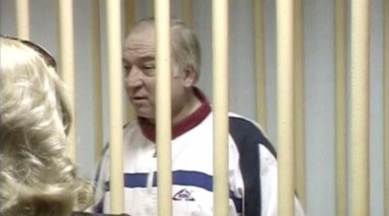In mystery attack on Russian double agent, tactics of Cold War and a new aggression
On March 4, Russian double agent Skripal and his daughter Yulia were found unconscious on a bench in Salisbury. The probe into the attack has spotlighted the dissident Russian diaspora in England, and several suspicious deaths.

British Prime Minister Theresa May Monday served an ultimatum on Russia, seeking an explanation by end of the day Tuesday, over how former spy Sergei Skripal was poisoned in Salisbury, Southwest England. May said evidence suggested Skripal was targeted by a “military-grade nerve agent of a type developed by Russia”. Home Secretary Amber Rudd has announced investigations into attacks on as many as 14 people, allegedly by Russia’s security services or mafia groups.
On March 4, Russian double agent Skripal and his daughter Yulia were found unconscious on a bench in Salisbury. The probe into the attack has spotlighted the dissident Russian diaspora in England, and several suspicious deaths.
monthly limit of free stories.
with an Express account.
Read | Ex-Russian spy poisoned in Britain — Everything you need to know
Who is Sergei Skripal?
He is a former Colonel who was part of the Russian army’s intelligence wing until 1999. He then worked for the Russian foreign ministry in Moscow until 2003. He was arrested in Moscow in December 2004 for spying for Britain, and sentenced to 13 years in prison in August 2006. Russian prosecutors said British intelligence, the M16, had paid Skripal $ 100,000 for “sensitive” information he had been supplying since the 1990s. In July 2010, Skripal was the beneficiary of a spy swap, and had since been living a quiet life in the UK.
Read | Highly likely Russia behind spy poisoning: UK Prime Minister Theresa May
The attack on him now appears to have broken the Cold War espionage etiquette that pardoned spies would be left alone in the countries that ultimately hosted them, wrote The Guardian. Several other high-profile defectors live in the UK.
What is the basis of the UK’s accusations against Russia?
Skripal was a double agent, a spy who had double-crossed colleagues in the Russian intelligence wing, betrayed fellow army veterans, and provided information to Britain that inflicted considerable damage on Russian intelligence. Also, British investigators have identified the nerve agent used in the attack as belonging to a family of deadly substances known as Novichok, believed to have been developed by the Soviets in the 1970s. A number of high-profile deaths linked to Russia have taken place on British soil. “No other major power employs murder as systematically and ruthlessly as Russia does against those seen as betraying its interests abroad. Killings outside Russia were given legal sanction by the nation’s Parliament in 2006,” wrote The New York Times.
Back in 1978, Bulgarian dissident Georgi Markov was poisoned on London’s Waterloo Bridge. He died three days later; a pellet containing ricin was found in his skin.
In 2017, BuzzFeed compiled a list of at least 14 deaths over the last two decades on British soil that could be linked to Russia. Most prominent was that of Alexander Litvinenko, a former officer of Russia’s Federal Security Service and fierce critic of President Vladimir Putin. Litvinenko, who drank green tea laced with radioactive polonium in a London hotel, identified his killers as Andrei Lugovoi, a former KGB officer, who is currently a member of Russian’s Parliament, and Dmitry Kovtun, a childhood friend of Lugovoi’s. Russia denied involvement in the murder.
Why do dissidents in the UK seem particularly vulnerable?
The UK is home to a large number of oligarchs fleeing the Putin regime. While May was prompt in her response on this occasion, she had, as Home Secretary in 2006, delayed a public inquiry into Litvinenko’s death, citing the need to protect “international relations” with Russia. The inquest that finally began in 2011, concluded in 2016 that the Kremlin “probably” ordered the hit on Litvinenko. Britain’s apparent reticence has been blamed on fears of retaliation and a desire to preserve billions of pounds of Russian money that pour into British banks and properties each year.
How has Russia responded?
On Monday, Kremlin spokesman Dmitry Peskov denied that his country had any role in the Skripal incident. “It happened on British territory, and in no way is a question for the Russian federation, or its leadership,” he said. Russia has also been quick to respond to May’s statements, rejecting the allegations and terming them as a “provocation”. Andrei Lugovoi, the prime suspect in Litvinenko’s murder, termed Prime Minister May’s speech as “irresponsible”.
***
The hit list
Alexander Litvinenko: A former officer with the Russian spy agency FSB died in a London hotel in 2006 after drinking tea from a cup laced with radioactive polonium
Alexander Perepilichnyy: A Russian businessman and whistleblower who died while jogging near London in 2012. An enquiry into his death is under way
Boris Berezovsky: The exiled Russian billionaire was found hanging in his apartment in Berkshire in southeast England in March 2013